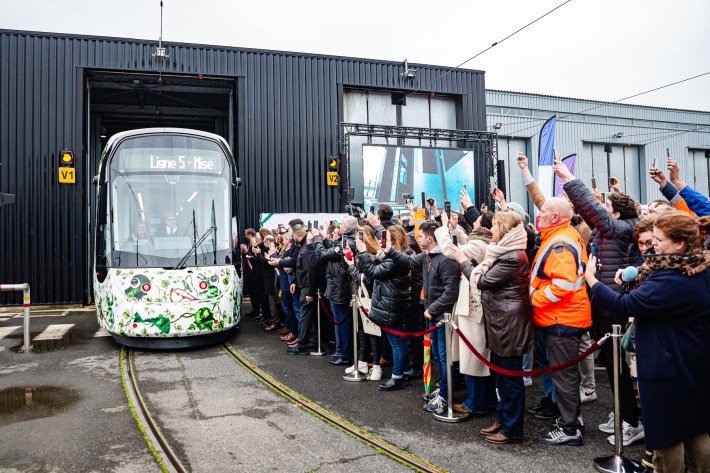The city of Montpellier is ensuring access to transit for all by making fares free.
And no, we're not talking about the similarly-named Montpelier in Vermont.
That honor goes to a city on the French Mediterranean, whose 500,000 residents have paid not one penny in public transportation fares since December of 2023. Providing unfettered access to five tramway lines and 41 bus lines, the program is the result of a political promise made by the socialist mayor, Michael Delafosse.
Delafosse made that decision against the backdrop of the the Gilets Jaunes (Yellow Vest) protests, which were mainly made up of working-class and middle-class workers demanding a better standard of living and a less expensive life in light of new fuel taxes and speed limits on French roadways. Simultaneously, though, youth advocates with the worldwide Fridays for Future protests were marching every Friday to raise awareness about climate change.
For Julie Freche, Montepellier's deputy mayor and head of public transportation, the answer to reconcile these two social movements was to introduce free public transportation.
“We had to respond to the ecological question raised by the youth — and at the same time, this response could not be to the detriment of the most fragile groups who can have the feeling that any new ecological initiative is punitive,” said Freche. “We decided to propose measures that would ultimately reconcile environmental protection with increased purchasing power, and [the answer] was the gratuity of public transportation."
And it worked. Since December 2023, ridership in Montpellier has increased 33 percent, attracting a new kind of rider in particular: the occasional traveler.
“Now, for the occasional traveler, there is no more barrier to take public transportation,” said Freche. “You don’t have to validate the ticket, [or even] to buy it.”
Not everyone in Montpelier is in favor of free transit; one transit worker's union named “Force Ouvrière” claims tramway and bus conductors are suffering more incivilities than before the change, in part because conditions onboard are now more crowded.
Experts say, though, that that perception is not confirmed by the numbers, which show a 9 percent reduction of incivilities between 2019 and 2024.
Increased enforcement may play a role in those numbers; the transit agency had deployed 42 agents on board by the end of 2025. But some experts argue that free transit itself can actually be the thing that reduces violence on board, since there's no farebox for thieves to steal.
Free transit can also deter crime by simply encouraging more ridership, and more eyes on the street.
"Someone who wants to be malevolent on public transport, if they find themselves alone at the back of the bus with one or two other people, they will find it easier to commit the act than when the bus is crowded and there is greater social control,” said Maxime Huré, researcher in mobility and transport policy at the University of Perpignan.

Investments in free fares are possible in part because of France's Mobility Tax, or Versement Transport, a regional payroll tax on companies with 11 or more employees which was created in the seventies.
In Montpellier, for instance, Freche says this tax has generated 124 million euros in 2024 alone, and covered 90 percent of all network operating costs, with last 10 percent of the costs are covered by the budget of the city council.
That's a staggering difference from the United States, where the 50 largest public transportation agencies rely on an unstable mix of federal, state, and local subsidies in addition to the roughly 36 percent of funding that's recovered from fares — and operations needs are particularly difficult to find money for.
In France, by contrast, the average farebox recovery is 17 percent — meaning public transportation is receiving more public funding and more tax revenue, making it far easier to transition to a far-free model.
"The Mobility Tax is a French exception”, said Huré.
Exceptional or no, there's evidence that Montpellier's experiment in fare-free transit is proving popular; to confront overcrowding on the tramways and buses, the city will open a fifth tramway line on the 20th December 2025.






